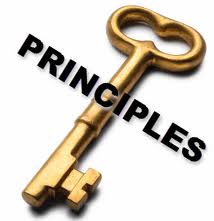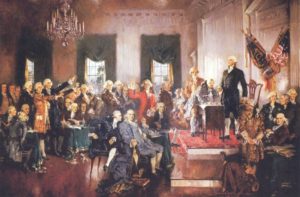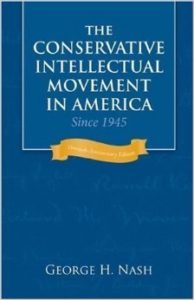I’ve been consistently concerned now for the last couple of years with respect to what is happening in our political realm. I come at politics and government from a very definite perspective.
Here, therefore, is my attempt at a personal manifesto.
I believe in Christian principled constitutional conservatism. Let me now explain what that means to me.
Christian
Jesus Christ is Lord of all aspects of life. My own life would have no meaning without His love, His forgiveness, and His direction for me. Politics and government fall under His Lordship. Consequently, whenever I think on those issues, I do so with a desire to ensure that His truth is the cornerstone for all governmental policies.
 I want to see all of the vital questions before us through the lens of Biblical faith and solid doctrine. I want a Biblical approach to the way government is organized and I want, as much as possible, people serving in that government who are dedicated Christians. Where that is not the case, I at least want to support those who are not hostile to Christian faith, but have respect for liberty of conscience.
I want to see all of the vital questions before us through the lens of Biblical faith and solid doctrine. I want a Biblical approach to the way government is organized and I want, as much as possible, people serving in that government who are dedicated Christians. Where that is not the case, I at least want to support those who are not hostile to Christian faith, but have respect for liberty of conscience.
I seek to help put into practice a Christian worldview on all manner of legislation, whether that be right to life/abortion, religious liberty, marriage, taxes, education, welfare, immigration—well, that’s the short list. I believe that no matter what the issue, there is a Biblical way to understand that issue.
Principled
 I shouldn’t have to make this a separate section. Christians ought to be, simply by the nature of their relationship to God and truth, naturally principled. However, I am dismayed by how often those who profess the name of Christ make disastrously unprincipled decisions. They allow emotions or self-interest to set aside what they claim to believe.
I shouldn’t have to make this a separate section. Christians ought to be, simply by the nature of their relationship to God and truth, naturally principled. However, I am dismayed by how often those who profess the name of Christ make disastrously unprincipled decisions. They allow emotions or self-interest to set aside what they claim to believe.
What principles mean the most to me?
- The inherent value of human life—we are all created in the image of God.
- The concept of self-government—God has so designed us to grow into maturity and make most decisions ourselves without the oversight of civil government. Not only individuals, but families, churches, voluntary organizations, etc., should be free of undue government influence.
- The sanctity of private property—government has no mandate from God to be our overlord on economic matters; He instead, as part of our maturity, seeks to teach us how to be His stewards of all types of property: money, material goods, our minds, and the free will He has given us.
- Voluntary association without the force of government coming down on us—people only unite when they are united, and that unity is internal, not provided by government coercion.
- Christian character—God intended us to carry out our lives as reflections of Him; the world only works correctly when we do things His way.
- Sowing and reaping—man is accountable for his actions, and he will receive back what he has sown: if obedience to God, blessings; if disobedience, dire consequences; we can’t blame society and claim victimhood status in God’s eyes because He will always hold us personally responsible for our choices, whether right or wrong.
Constitutional
I believe in the concept of the rule of law, meaning no man, regardless of high rank in society, is above the law. We all are to be judged by the same standard.
 I believe in the system set up in this nation through the Constitution that gave us a solid basis for the rule of law.
I believe in the system set up in this nation through the Constitution that gave us a solid basis for the rule of law.
I believe we need to hold firm to the original meaning of those words in our Constitution and not allow judges, legislators, or presidents to stray from the limited authority granted in that document.
Changes to the authority given to our federal government must go through the proper constitutional channel: the amendment process as outlined in the Constitution. A judge’s gavel is not a magic wand.
Anyone running for the presidency or for Congress, and anyone nominated for a federal judgeship, at whatever level, all the way to the Supreme Court, must pass muster as constitutionalists. No one who denigrates the rule of law should ever be supported for public office.
Conservative
 This is a relative term. In a totalitarian system, a conservative would be one who wants to conserve totalitarianism. But in our system, a true conservative is someone who seeks to conserve what the Founders established. Often that can happen only by acting to overturn or reverse what has been done to destroy the Founders’ ideals. If a revolution has occurred, a real conservative might have to take on the nature of a counterrevolutionary in order to reestablish the foundations.
This is a relative term. In a totalitarian system, a conservative would be one who wants to conserve totalitarianism. But in our system, a true conservative is someone who seeks to conserve what the Founders established. Often that can happen only by acting to overturn or reverse what has been done to destroy the Founders’ ideals. If a revolution has occurred, a real conservative might have to take on the nature of a counterrevolutionary in order to reestablish the foundations.
Conservatism does not merely conserve the status quo—if that status quo is a deviation from the constitutional system bequeathed to us.
Conservatism is not “reactionary”; it is a positive movement to secure the blessings of liberty to us and to future generations.
This is where I stand. This is my personal manifesto.
